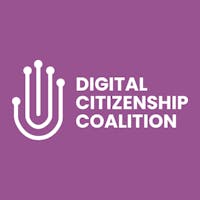In an era where technology and digital platforms are integral to our everyday lives, the role of digital citizenship is ever more critical. This is especially true in educational settings, where equipping students with digital citizenship skills is essential for their safe and responsible navigation of the digital landscape. On February 13, 2023, the Digital Citizenship and Media Literacy Act was introduced in the Senate. The bill is aimed at increasing media literacy education and helping students navigate disinformation, ultimately strengthening digital citizenship.
The urgency of such educational initiatives is underscored by a Pew Research Survey revealing that 44 percent of adults aged 18 to 49 report they are online almost constantly. Schools are thus faced with ensuring students are adept at engaging with digital tools in a manner that is both ethical and informed, regardless of their starting level of digital literacy or the extent of their technology access outside the classroom.
“As more and more of our important life moments happen in online spaces, it is critical that we are also preparing young people to be meaningful contributors to our digital world. Digital citizenship is about far more than just helping kids be safe online; it’s about empowering them to use technology to solve real-world problems, to know how to balance their time between a variety of online and offline activities, to be curious learners and to use digital tools to deepen their relationships with their family and friends,” says Richard Culatta, CEO of ISTE and ASCD.
Understanding the importance of digital citizenship led to the development of five competencies by the ISTE-led Digital Citizenship Coalition: balanced, informed, inclusive, engaged and alert. Beyond the digital citizenship competencies, ISTE provides a variety of resources aimed at helping educators prepare students to use technology safely, ethically and effectively. Digital Citizenship in Action is an ISTE U course eligible for graduate-level credit.
Recently, EdSurge spoke with Christina Scheffel, an instructional technology specialist supporting teachers across the Indian River School District in Sussex County, Delaware, about the importance of teaching digital citizenship. All students in her district, which has approximately 11,000 students and 900 staff members, are provided with Chromebooks that they can take home. The state of Delaware has made significant strides to ensure that students have access to technology at home, primarily through the provision of Wi-Fi hotspots.
EdSurge: Why is digital citizenship so important?
Scheffel: Teachers, students — really everyone, at this point — we spend a lot of our time online, and because we spend so much time online, technology is not really an extra thing anymore; it's completely ingrained into our everyday lives. Even our youngest students do some activities on the computer. So it's really important for us to help them understand how to be safe online at an early age, how to interact appropriately online and how to apply the rules of technology etiquette.
I think it's important to start digital citizenship as early as possible. I have a three-year-old, and he sees me use my phone regularly. Something as simple as his understanding that I will put my phone away to pay attention to him is important. That's part of digital citizenship; that's part of that balanced competency. So, any way that we can model appropriate behavior starting as early as possible is key.
How do you and your technology team support digital citizenship?
It has been a huge work in progress. At first, because of the pandemic, our primary goal was just getting staff and students to understand how to use the technology. We caught everyone up to speed by providing professional learning about technology and how it is incorporated into all aspects of the curriculum.
We've moved past that and need to start learning to use technology responsibly as staff, students and families. We interact with technology as a key aspect of our daily activities. If we're going to ask students to use technology and prepare them for this world filled with technology, it's our responsibility as schools [and teachers] to help them use it safely, effectively and for good purposes.
To support staff, we model digital citizenship during professional development, showing teachers things they can do with their students to promote good online behavior.
Our approach to engaging families has been a learning process. Initially, our district organized digital citizenship nights and distributed promotional materials to involve families, but attendance was weak. So we shifted our strategy.
Integrating digital citizenship into existing school events proved more successful. We realized that parents and caregivers will receive the information better if it comes from their child’s school or someone they trust: their child’s teacher. They aren’t going to listen to an IT person from the district office.
The technology team designed packets with technology tips for students, including rewriting the acceptable-use policy in student-friendly language, and distributed them to schools. I walked into a classroom to fix an unrelated issue, and I saw that a teacher had printed out that packet to send home and added a signature line for parents to sign. That is how we can reach families!
What trends do you notice with your students about digital citizenship and well-being?
Last school year, we interviewed students from various schools across the district, elementary through high school, about their technology habits at school and home. One trend that kept coming up was that a lot of students feel like they must always be on their devices because they don't want to miss out. That fear of missing out keeps students glued to their phones, which just builds up into anxiety. That behavior is something I've seen in a lot of adults, including me. Our technology team is brainstorming ways to address it, even if it's just making people more aware of it so we can discuss it in more depth.

What is the importance of the five digital citizenship competencies?
Balanced is about that balance between what you're doing online and offline. That behavior can influence whether it's hard for a student to close a device when they're not supposed to have it or whether or not they're trying to sneak a glance at their phone when they're supposed to be engaged in class.
Informed is about gathering credible information to process what you see online. That one is really important in schools, especially in content areas where you're doing research papers or citing sources. Being informed was a big part of my class when I was an English teacher.
Inclusive is really the citizenship part of digital citizenship: treating others with respect and empathy.
Engaged is all about using technology for good. A lot of times, we tend to focus on the negatives, which is understandable because the negatives can be very scary, especially things like cyberbullying or other sorts of unethical online behaviors. But there is a lot of good we can do with technology as well.
Alert is about safety, which previously seemed to be the primary focus of a lot of digital citizenship initiatives, right? There are a lot of places online where all people — students and adults — can get into trouble, and it's important to know how to be safe.
The five competencies are so essential for students to navigate the digital world, and the general public is recognizing that. Delaware passed a media literacy bill, which was partly created because of issues that have arisen in digital citizenship. The existence of that law and the push for more media literacy in classrooms show that communities realize the importance of digital citizenship in our society.



